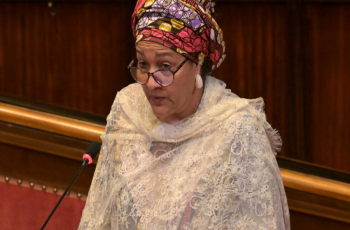US Warns Taliban Of ‘Costs’ Over University Ban For Afghan Women
US secretary of state says Taliban is sentencing women and girls in Afghanistan to a ‘dark future without opportunity’.
Photo: TYT
US Secretary of State Antony Blinken has warned the Taliban that the United States will impose “costs” on the group if it does not reverse its recent ban on women attending university in Afghanistan.
Blinken said on Thursday that the Taliban-led government in Kabul will not be able to improve relations with the rest of the world if it continued to deny Afghan women their fundamental rights.
“What they’ve done is to try to sentence Afghan women and girls to a dark future without opportunity,” Blinken said during an end-of-year news conference in Washington, DC.
“And the bottom line is that no country is going to be able to succeed – much less thrive – if it denies half its population the opportunity to contribute.
“And to be clear, we’re engaged with other countries on this right now – there are going to be costs if this is not reversed, if this has not changed,” said Blinken, without specifying what the measures might include.
Afghanistan’s aid-dependent economy is already under heavy US and Western sanctions following the Taliban’s takeover of the country last year amid the withdrawal of US troops, which ended a 20-year occupation.
In response to widespread fears of a return to the harsh policies that dominated the Taliban’s rule of Afghanistan in the 1990s, the group initially promised a more moderate government when it took power in August 2021.
But the move to suspend university education for women, announced earlier this week, sparked outrage across the world, including from several Muslim-majority countries that called on the Taliban to reverse the decree.
Turkish Foreign Minister Mevlut Cavusoglu said on Thursday that the ban was “neither Islamic nor humane”.
“What harm is there in women’s education? What harm does it do to Afghanistan?” Cavusoglu said. “Is there an Islamic explanation? On the contrary, our religion, Islam, is not against education; on the contrary, it encourages education and science.”
In the Afghan capital, about 50 mainly female protesters gathered outside Kabul University, holding banners and chanting, “Education is our right, universities should be opened.”
The previous day, students at Nangahar University in eastern Afghanistan also demonstrated and male medical students walked out of exams in protest at their female classmates being excluded.
The Taliban has defended the restrictions, saying that they aim to preserve the “national interest” and women’s “honour”.
Acting Higher Education Minister Nida Mohammad Nadim, in his first comments on the matter, told Afghan state broadcaster RTA that several issues had prompted the decision, including female students not wearing appropriate Islamic attire and interactions between students of different genders.
“They didn’t observe hijab, they were coming with the clothes that mostly women wear to go to a wedding,” he said.
Nadim also said during the interview that discussions over female education were ongoing.
Meanwhile, the decision continues to draw widespread criticism, with the Group of Seven (G7) wealthy nations saying gender persecution may amount to a crime against humanity, in a statement on Thursday slamming the Taliban’s decree.
In Washington, Blinken also said the ban would harm any chance of the Taliban improving its relationships with other countries.
“Any prospect that the Taliban seeks for improved relations with the world, with the international community, which is something that they want and we know that they need – that is not going to happen if they continue on this course,” he said.
-

Denmark launches its biggest offshore wind farm tender
2024-04-22 -

Nobel laureate urges Iranians to protest 'war against women'
2024-04-22 -

'Human-induced' climate change behind deadly Sahel heatwave: study
2024-04-21 -

Moldovan youth is more than ready to join the EU
2024-04-18 -

UN says solutions exist to rapidly ease debt burden of poor nations
2024-04-18 -

Climate impacts set to cut 2050 global GDP by nearly a fifth
2024-04-18 -

US sterilizations spiked after national right to abortion overturned: study
2024-04-13 -

Future of Africa's flamingos threatened by rising lakes: study
2024-04-13 -

Corporate climate pledge weakened by carbon offsets move
2024-04-11 -

Humanity lost 'moral compass' on Gaza: top UN official
2024-04-10
